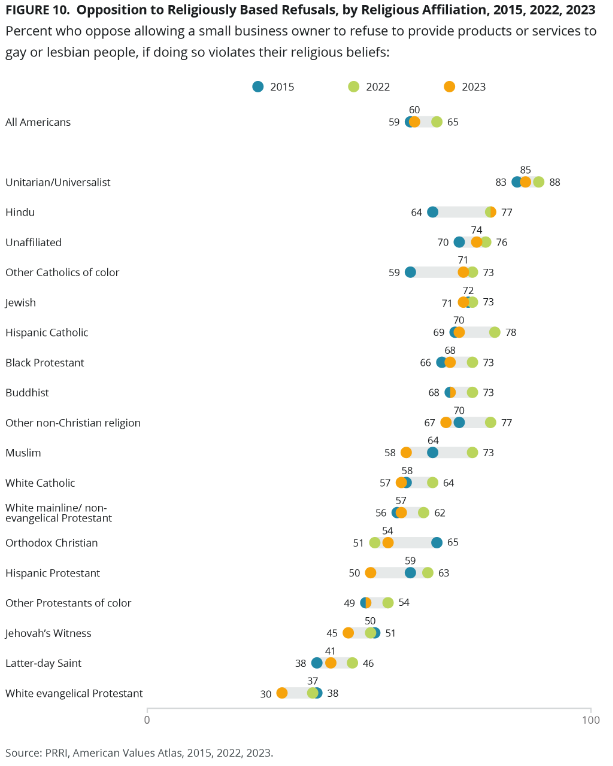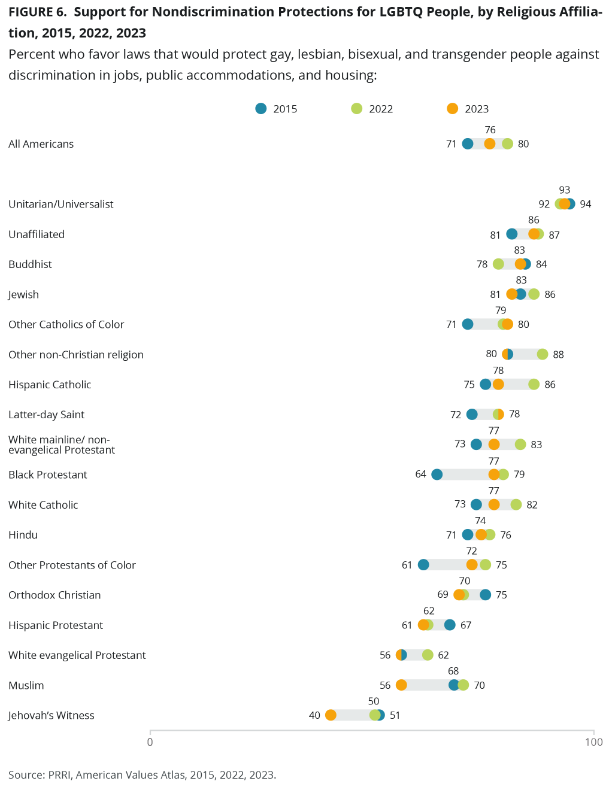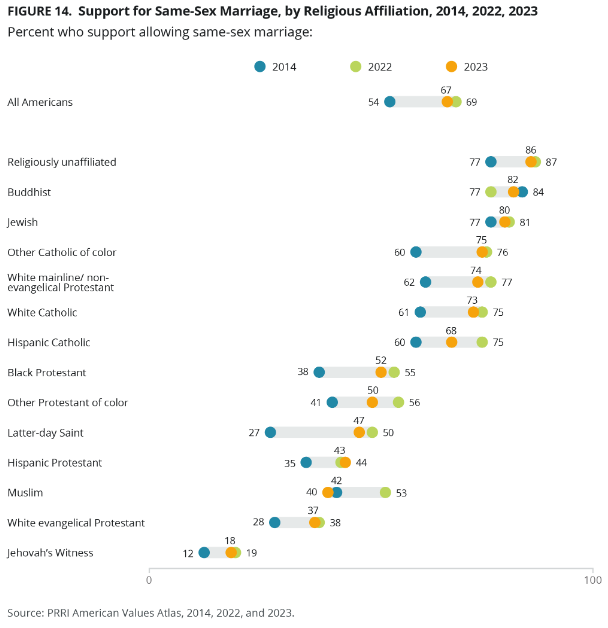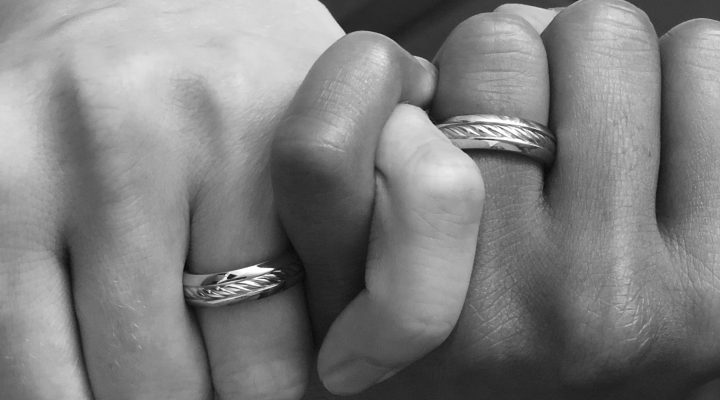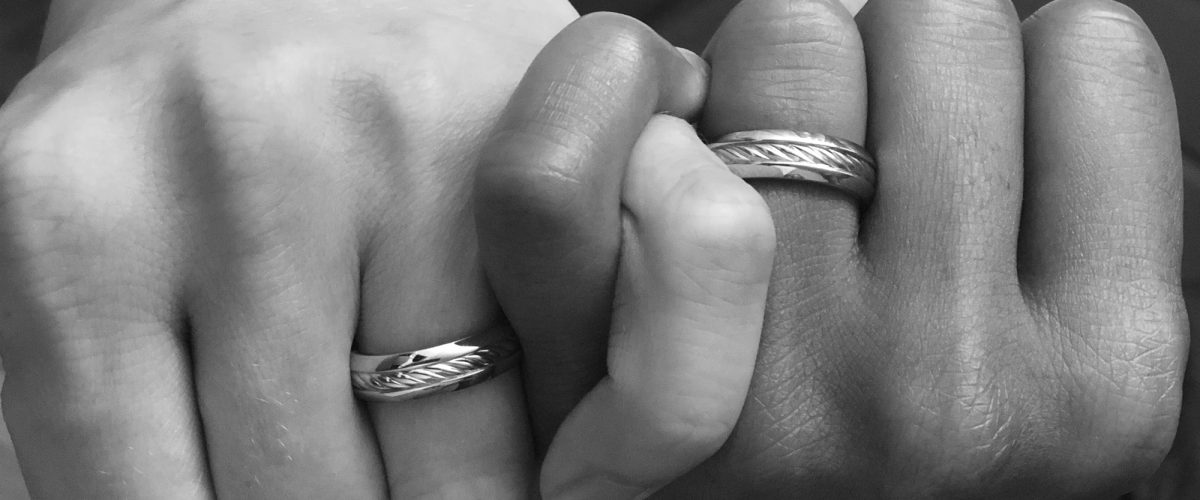Americans of faith contributed to a small decline in overall support for LGBTQ rights in 2023, even as most U.S. adults continued to oppose discriminatory policies and practices aimed at gender and sexual minorities, according to a new study by Public Religion Research Institute.
Declines in support for LGBTQ civil and legal rights were measured across the board, PRRI found in its online interviews with 22,000 U.S. adults last year.
“Our survey shows that support for LGBTQ rights has dipped slightly from 2022 to 2023, although the vast majority of Americans continue to endorse anti-discrimination protections for LGBTQ Americans and the rights of same-sex couples to marry,” PRRI CEO Melissa Deckman said. “The growing partisan divide on these issues shows the effect of the continuous use of LGBTQ identity and LGBTQ rights as a wedge issue in our nation’s culture wars.”

In 2023, 76% of adults expressed support for policies protecting LGBTQ Americans from discrimination in employment, housing and public accommodation. That was down from 80% in 2022.
While that majority includes 89% of Democrats, 78% of independents and 59% of Republicans, there were declines in these subgroups over the past two years, PRRI reported. “In 2022, two in three Republicans supported laws protecting LGBTQ Americans, compared with roughly six in 10 today. Support for nondiscrimination protections among independents also dropped four percentage points, from 82% in 2022 to 78% in 2023.”
Although majorities in most faith groups were found to support LGBTQ protections, there were notable decreases among traditions from 2022 to 2023. Approval among Muslims fell the furthest, from 70% to 56%, followed by Jehovah’s Witnesses (51% to 40%), Hispanic Catholics (86% to 78%), “other non-Christian” religions (88% to 80%), white mainline Protestants (83% to 77%) and white evangelical Protestants (62% to 56%).
Smaller dips in support of LGBTQ nondiscrimination policies also were recorded among Hispanic Protestants, Orthodox Christians, Black and other Protestants of color, white Catholics and Hindus, among others.
“The strongest supporters of nondiscrimination protections include Unitarian Universalists (93%), religiously unaffiliated Americans (86%), Buddhists (83%), and Jewish Americans (81%),” the report says.
The PRRI study also probed Americans’ attitudes about religiously motivated service refusals — instances in which individual business owners, companies or ministries such as faith-based adoption agencies cite religious convictions to refuse service to LGBTQ customers or clients.
Overall opposition to such discrimination dropped from 65% two years ago to 60% in 2023, with slight decreases among members of some faith groups contributing to the decline, PRRI reported.
Those included Hispanic Protestants (63% to 50%), Hispanic Catholics (78% to 70%), Muslims (73% to 58%), Black Protestants (73% to 68%) and white mainline Protestants (62% to 57%).
“Among adherents of three religious traditions — white evangelical Protestants (30%), Latter-day Saints (41%), and Jehovah’s Witnesses (45%) — a minority opposes while the majority stands in support. Among white evangelical Protestants, opposition has consistently declined from 38% in 2015 and 37% in 2022 to 30% in 2023,” the report says.
When PRRI asked U.S. adults to rate their support for same-sex marriage, 67% said they support the practice, representing a 13 percentage-point increase from 2014 but a slide from the 69% recorded in 2022.
Support for same-sex marriage among religious Americans remained strong in the study, led by 88% of Unitarian Universalists, 86% of religiously unaffiliated Americans, 82% of Buddhists and 80% of Jewish Americans.
But there were declines in support of same-sex marriage among religious Americans from 2022 to 2023, with Hispanic Catholics (75% to 68%) and Muslims (53% to 40%) leading the way. Smaller decreases were measured among white mainline Protestants (77% to 74%), white Catholics (75% to 73%) and Black Protestants (55% to 52%).
The survey also measured the effect of Christian nationalism on American attitudes toward LGBTQ rights. Responses varied according to where respondents landed on a spectrum from rejecting to fully supporting the political ideology.
“Those Americans who strongly disagree with the core tenets of Christian nationalism, who PRRI defines as Christian nationalism rejecters, are nearly unanimous (93%) in their support for laws that protect LGBTQ people from discrimination in housing, employment and accommodation, including more than seven in 10 who strongly favor nondiscrimination policies (72%),” PRRI reported. “Only among Christian nationalism adherents (those who agree or completely agree with statements that link American identity with Christianity) does a majority (52%) oppose nondiscrimination laws.”
In addition, 32% of Christian nationalism adherents expressed opposition to religiously motivated denials of service to LGBTQ people, compared to 85% of rejecters, the summary notes. “Just 22% of Christian nationalism adherents support same-sex marriage, compared with 93% of Christian nationalism rejecters.”
